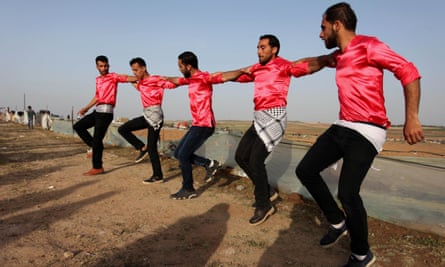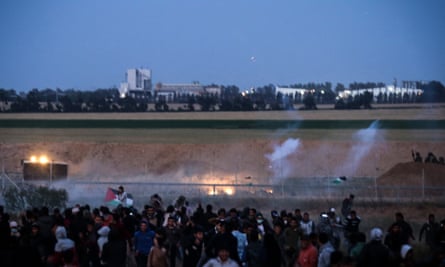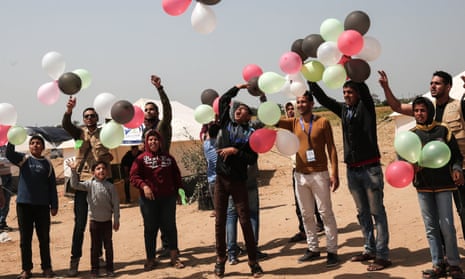Sipping mint lemonade while looking out at the Mediterranean, the man credited with instigating a demonstration movement that has rocked Gaza is at odds with the image of the protests that has been put forward by Israel.
Israel has described the recent demonstrations on the Gaza frontier as “riots” and a ploy to “camouflage terror attacks” led by Hamas, a militant group founded on the idea that Israel has no right to exist.
Yet Ahmad Abu Artema, who claims no Hamas affiliation, holds an ideology more often attributed to that of Israel’s president: he says he wants to see Palestinians and Israelis living in one country as equal citizens.
“If you want my personal opinion, I don’t believe in liberation [of land in Israel]. I believe in ending the apartheid system in Israel like the end of the apartheid system in South Africa, and we live all in one democratic state,” Artema said in an interview in Gaza City. “I want to live with Israelis.”
Following three wars during the past 10 years, Palestinian action in Gaza against Israel has overwhelmingly been seen as an armed fight. But Abu Artema hopes a new peaceful protest movement, widely supported by thousands of demonstrators including elderly people, women and children, will skew that image.
Groups of young men at the front of the demonstration last Friday threw rocks, burned tyres and in some cases tried to damage a border fence on the first day of the planned six-week demonstration demanding the right of return for refugees. Yet most participants simply turned up and stayed hundreds of metres back, away from an Israel-ordered no-go area.

Israel’s response to the protests, however, has been widely criticised. The UN and EU have called for independent investigations after soldiers were accused of killing more than 16 people and shooting hundreds of others, mostly in the legs.
The movement has put both societies on edge. Many are now anxiously waiting to see how protests this Friday proceed.
A leading Israeli human rights group called B’Tselem made the rare move of telling soldiers they were “duty-bound” to disobey live fire orders on unarmed civilians.
In Gaza, there have been calls on social media for participants to use tyres to create a wall of black smoke to blind the Israeli snipers, although Abu Artema has warned against this, saying it will exacerbate tensions. An organising committee on which he sits has called for people not to approach the perimeter, to avoid a repeat of last week’s bloodshed.
Many attribute the new movement to a viral Facebook post, written by Abu Artema, which pondered what would happen if thousands of Gazans, the vast majority of whom are refugees and their descendants, attempted to peacefully cross the frontier to reach their ancestral homes.

But as the idea turned into a real plan, organisers modified it to avoid danger at the border and agreed they would pitch tents and have meals, traditional dabke dancing, football games and even weddings hundreds of metres from the perimeter. “We are looking for a new culture,” he said, showing a video on his phone of a marriage at the protest camp last weekend.
Abu Artema, born in 1984, is an activist and journalist who has spent his entire life in Gaza, except for two trips to Egypt to visit his mother on the Sinai side of the border. His family were refugees from the city of Ramla, having fled in 1948 around the time of the creation of Israel.
He says he represents a rejection of armed resistance, in part because he believes that strategy has failed. “It’s not necessary to resist the occupation with bullets. You can resist the occupation with dabke, or by just sitting there.”
Political parties, most notably Hamas, openly support the movement and have sent members and fighters to participate, a decision Abu Artema says he accepts. “I’m not a spokesman for Hamas,” he said. “It’s positive that those people started to believe in peaceful struggle. [Israel] wanted to drag it to violence, they don’t want to confront people. They want to be confronted by a rocket or a missile.” Just because a small number of people threw stones, he said, that did not warrant live fire.
The Israeli military, which disputes last Friday’s casualty count, said it used bullets only when necessary, although videos appeared to show people shot while running away. It also pointed to an attempted gun attack on soldiers along the border.
Does Abu Artema feel the movement can avoid spiralling out of control? “Personally, I believe in peaceful protest. There is a dream and there is reality, and there is a difference between them.”
